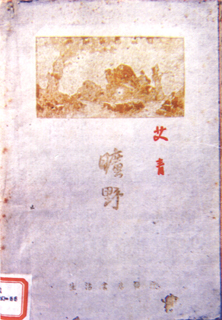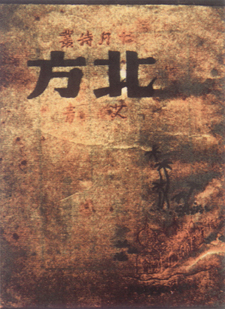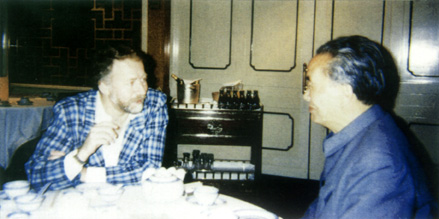[PROLOGUE]
On May 5th 1996 the literary world lamented the passing of Ai Qing. It was as if the sun had set on the world of modern Chinese poetry. He endured great hardship for much of his life, but leaves behind him a corpus of enduring masterpieces. He conveys the suffering of China in a profound manner, and preaches a gospel of human ideals and justice. Although he is now silenced, we may still sense his greatness.
[INTRODUCTION]
The following passage appeared in the foreword to the poetry anthology Baise hua• (White Flower):
"Free verse in China developed from the May Fourth• cultural movement and embarked upon a meandering voyage of exploration. It was not until thirty years later that Ai Qing and others like him first appeared like a tricking stream which went on to flow as a vast, broad river. They extracted their poetry from the quiet stillness of books, from the bookish solemnity of lecture rooms; they used people's hardship and struggle to temper it; they used simple, natural, clear and sincere sounds to sing out for everyone's today and tomorrow. This was the struggle of Chinese free verse. The contributors to this anthology adhere strictly to this tradition. The majority of them will admit freely that they matured under the influence of Ai Qing."
In fact, it is not only the poets whose labours in writing free verse have culminated in the book Baise Hua (White Flower) who have benefited from the influence of Ai Qing; it is rather the entire Chinese poetic establishment, from the 1930s to the present day.
§1. THE POETIC SPIRIT WHICH COMPLETED THE REVOLUTION IN MODERN POETRY AND THE MODERN POET
We are all able to bask in the sunshine of Ai Qing's memory. He educated modern Chinese poetry to maturity. It is impossible for anyone who knows and celebrates the tradition of modern Chinese poetry to deny or attempt to ignore Ai Qing's brilliance. It was Ai Qing who finally liberated Chinese poetry from the solemn classical metre and the stiff, mechanical traditional style. All traces of the stench of decay are banished from his poetry. He gives Chinese poetry a modern, pulsing rhythm. He has created a style of expression which is fresh and bright, full of vivid human emotion, fluid and elastic. Ai Qing turns the most common, everyday language into so many glittering strings of pearls. His genius lies in his treatment of ordinary things in an ordinary way. As part of the process he reveals his power to transform everyday language into poetry.
From the time when Hu Shi's• first experiments with poetry, modern Chinese poetry has developed from nothing to ground-breaking levels of achievement. But for a long time to come it was still frustrated by an inability to shake off the shadow of rigid structures and rhymes which were said to have emerged as spin-offs from classical poetry, ci•-poems and qu•-lyrics. It was typically the case that Chinese poetry was unable to break free of the constraints of traditional poetry and be truly independent. The earliest example of verse written in the vernacular language known as baihua• is Zhou Zuoren's• work Xiaohe•(Little River). One of the strong points of Little River is that it is completely free of traditional metre and lends the vernacular language a hitherto unknown purity, which is sullied only by an element of prosaic amateurishness. Chinese poetry's transformation from classical to modern has been tortuous and problematic, and was effected to completion in the hands of Ai Qing. The story of the development of modern poetry had a glorious beginning with Hu Shi. Guo Moruo• then introduced the romantic passion of the May Fourth cultural movement. But the establishment of the new vernacular poetry as an autonomous literary genre was finally completed by Ai Qing. As such, his contribution is an important landmark. Ai Qing is numbered amongst the trail-blazers and founding fathers of modern poetry.
 Cover.
Ai Qing's 《艾青》 Desert.
Cover.
Ai Qing's 《艾青》 Desert.
In 1932 Ai Qing returned to China from France. The same year, he was arrested and sent to prison. Whilst in jail, he wrote the most important poem of his life, Dayan he — wo de baomu• (My Nanny the River Dayan). In this poem, Ai Qing reveals for the first time his doggedness and humanitarian convictions as a poet. His writing initially encountered difficulties, and it must be said that he was not naturally outspoken, like some poets who unburden their grievances readily. From the very beginning, Ai Qing established his poetry on a broad base, embracing Chinese society and all humanity. His work displays momentous power and considerable intelligence.
§2. AI QING — FASHIONED BY HARDSHIP
Ai Qing was trained by the adversity he faced. From the very beginning, this world poet perceived the melancholic shades of the Chinese sky and earth as interpreted by the visual arts. He converted those colours into sound, and with those sounds he concerned himself body and soul with the sorrow and indignation which existed throughout China. He appraised China's yellow earth, drenched with blood and tears. The laments and cries which issued from the yellow earth certainly offered his poetry no cause for celebration. But this was a poet with a full understanding of China's grief who could give it full expression:
"Why are my eyes so often filled with tears? Because my love for this land is so deep."
— from Wo ai zhe tudi•(I Love this Land).
The handcart which crumbles the parched bed of the Huang He• (Yellow River) and leaves behind deep, ridged ruts; the beggar wandering along the railway tracks with hand ever outstretched: these images are testimony to the vast wilderness of China's sorrow. The poems show the deep emotional bond linking Ai Qing to his land and his people. He left the bosom of his native village and the Dayan River, in the south of China, and headed towards the vast, grief-stricken country in the north. On all levels from the individual to the social, Ai Qing felt the hardship suffered everywhere in the country: the chaos of war and the famine of failed harvests, injustice and domination. The situations he encountered were uniformly acute. All this experience flowed into Ai Qing's clear-headed and slightly casual writing, producing Ai Qing's particular brand of poetic beauty. Ai Qing's personal style was this: a sombre-toned melody accompanied by free-handed harmony. Some poets have talent but are unable to capture the spirit of their age; some poets catch the mood of their time but lack artistic judgement and originality. Ai Qing, however, was both right on the pulse of his era and endowed with a entirely individual artistic flair. He became the world's most influenial poet this century.
§3. A CHILD OF THE SUN AND THE DAWN
It is characteristic of Ai Qing to draw on his personal experience of sorrow and suffering to call our attention to the reality of the hardship in China. Another, perhaps more important, trait, is the way Ai Qing lights a beacon to illuminate our surroundings in the darkest depths of night — he ignites ideas with we can use to tackle the darkness. Ai Qing guides and inspires us with both emotionally and spiritually. He is a child of the sun and the dawn: even during the direst hour of the reign of darkness, he still manages to convey the to us a powerful message:
“從遠古的墓塋,
從黑暗的年代,
從人類死亡之流的那邊。
震醒沉睡的山脈。
若火輪飛旋於沙丘之上,
太陽向我滾来……”
("From an ancient, distant tomb,
From the age of darkness,
From the torrent of human death,
The mountains are jolted to life from a deep slumber.
Wheels of fire circling above the sand dunes,
The sun hurtling towards me...")

Cover.
Ai Qing's 《艾青》 North
Singing song after song written in this vein, he renounces the darkness and points towards the light at the end of it. When we find ourselves stranded in the darkness for too long, he informs us of the dawn to come. When the long and terrifying night has receded, those of us who are lucky enough to survive death to live a second time can hear his song celebrating the new dawn facing us. Our impression of Ai Qing is therefore two-fold: he is both the harbinger of China's doom, but also the messenger bearing glad tidings and justice for mankind.

Luís Sá Cunha (left) — director of the "Review of Culture"— and Ai Qing (right).
Photograph taken in Macao, in 1987.
§4. A POETIC SOUL SINGING IN PERPETUITY
Of all Chinese poets, Ai Qing's works span the longest period of time, though throughout his career he remained full of youthful vigour. It is all too often the case that the works of poets in their waning years can lack sincerity. However, in the 1980s, after years of hardship and suffering, Ai Qing recreated the all the brilliance of a second youth in works such as Yu huashi•(Fish Fossil), Guang de zange•(Song in Praise of Light), and Gu Luoma de de doujichang• (The Amphitheatre of Ancient Rome). When people write the history of poetry, they often say that current or consecutive trends supersede or in some way negate the achievements of their predecessors. It is our opinion, however, that the progress of poetry is a process of development and refinement. The history of poetry is concerned more with addition than subtraction. Some poets are destined forever to resist obsolescence, certain to stand their ground in space and time. Ai Qing is destined for such permanence:
"He immerses himself, body and soul, in the midst of people's joys and sorrows, loves and hates, and senses their aspirations. The expectations and desires in their [this generation of poets'] writing develop in the light of humankind's hope for a brighter tomorrow. Only a poet who does not contradict this common wish will win the respect of people today and retain the attention of people tomorrow."
— from Shi yu shidai•(Poetry and the Age).
Any poet who can aspire to this ideal will earn immortality.
When Ai Qing was still with us, we were able to sense the greatness of his existence even when he was silent. Now he is no longer there with us, and we can feel a gaping hole which will never be easy to fill. Ai Qing's sun has set, leaving us with a long darkness. We have lost Ai Qing. It is as if Chinese poetry had suddenly lost all its substance. This is the truest expression of how it now feels to bid farewell to Ai Qing.
Translated from the Chinese by: Justin Watkins
* Professor in the Department of Chinese at Beijing University. •
start p. 153
end p.